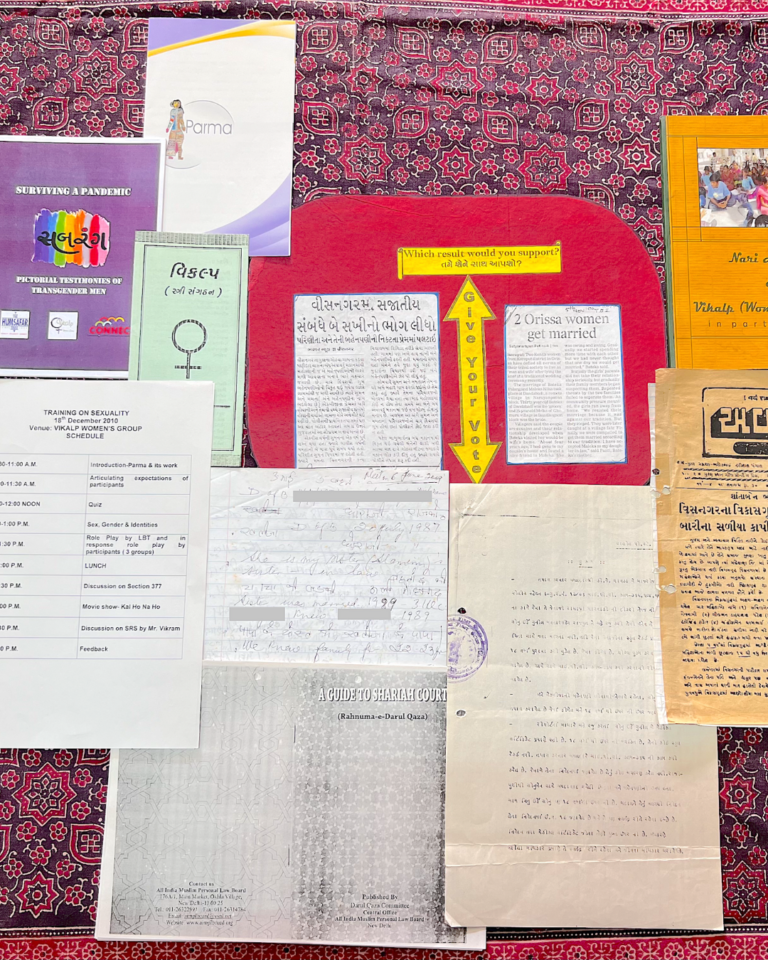1988-2022; Organisational documents, correspondence, media documentation, legal documents and case notes, photographs, ephemera, publications; 2 boxes. This collection can be accessed in person at the archive.
Biographical Note: Maya Sharma and Indra Pathak are feminist, queer, grassroots activists based in Vadodara, Gujarat. Maya, a journalist, has a history of working with trade unions and with the autonomous women’s movement before entering the queer movement. Indra previously has worked with labourers, the Mahila Samakhya programme and Nari Adalats in rural Gujarat.
Currently, they lead Vikalp Women’s Group, a feminist-queer NGO in Vadodara. Indra has been working with Vikalp since the late 1990s, and Maya’s association started when she began research on lesbians, FTM transpersons and queer female couples in rural Gujarat. Aided by Vikalp, this project culminated in Maya’s first book, Loving Women: Being Lesbian in Unprivileged India (2006).
Note on the organisation: By the mid-2000s, Vikalp initiated work in the HIV/AIDS field, and with Maya’s and Indra’s involvement expanded towards working with communities of queer women and FTM transpeople. They were instrumental in creating Parma, a self-support group for female born queer individuals in Gujarat, which is now called Sabrang.
Note on collection: Built over a period of almost two decades, this collection represents Maya’s and Indra’s work with queer communities in Gujarat and some of their organisational work with Vikalp and Parma/Sabrang.

The collection is divided into five series: 1. Vikalp Internal Documents, 2. Parma, 3. Parma/Vikalp Crisis Intervention, 4. Maya Sharma’s Writings, and 5. Vikalp’s Photo Albums
The first series, Vikalp Internal Documents, covers programmes and activities that Vikalp participated in and organised as part of their mission towards social change; and includes the organisation’s publications, and a set of hand written letters sent to them by queer women from across the state.
The second series, Parma, documents the group’s interaction with the media and other activities.
The third series, Parma/Vikalp Crisis Intervention, contains legal documents from some of the cases in which Parma/Vikalp intervened to lend support to queer individuals and newspaper clippings and magazine articles on violence against lesbians and Assigned Female at Birth (AFAB) transpersons. This series contains some of the primary sources on which Loving Women (2006) and Footprints of a Queer History (2022) are based.
The fourth series, Maya Sharma’s Writings, is a selection of some notes from fact finding committees she was part of, and notes from meetings with people.
The fifth series, Vikalp Photo Albums, has eleven photo albums which document Parma/Vikalp’s journey, the people involved and some memorable events.
A two-hour interview with Maya and Indra where they share some personal histories, talk about their career and the decades long process of constituting this collection accompanies the material.
See also: Queerphobic violence reported in the media (Sangama Documentation Project) and work of LesBiT (Sangama Organisational Documents) in the Sangama Collection; Meeting at UTC, Bengaluru, 2011 (Video Documentation of the Fight Against 377) in the T. Jayashree Video Collection.